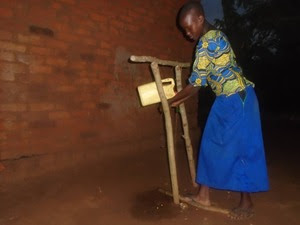
We constantly talk about handwashing, and not because of the pandemic. We have always educated communities on handwashing, and after three years in a village, tippy tap coverage and usage typically hovers around 25% (this means that only 1 in 4 households has a handwashing station and uses it), which is a significant increase from when we start working with a village, but still low overall. The threat of coronavirus has changed the playing field.
As the government issued quarantine orders across the country, shutting down businesses, schools, and nearly all transportation, our communities were reaching out to us asking for materials to make the basic handwashing stations we have been demonstrating in the the last year. After making several phone calls to gather what materials we could, the shop owner delivered a bundle of small 3 liter jerry cans to the office. We filled reused plastic water bottles with liquid soap, packed what we could in boxes, and strapped all of this to the UVP motorcycle and headed to the village of Kamira.

We arranged to meet with the VHT to deliver the materials and provide guidance on how to distribute them. The VHT was confident community members would be excited to have access to the basics, and he was proved right when he called me the next morning saying that all the materials were spoken for and could we please bring more jerry cans.
It was less than a week later when we were able to secure more materials and deliver them to Kamira, and upon arrival, Janat, a community member and mother, walked up and stated that she already had the frame for her tippy tap and she had been waiting for the last several days for this delivery of jerry cans so she could finish her tippy tap. And she was only one of many people who expressed the same sentiment. They had been waiting for us! Since transportation had been drastically reduced, community members had no way of traveling to secure materials like jerry cans, so UVP was their only connection to the supply chain.
The grateful smiles conveyed so much more than gratitude; it was a sign of trust during an uncertain time.
By Edmund Okiboko, Managing Director
